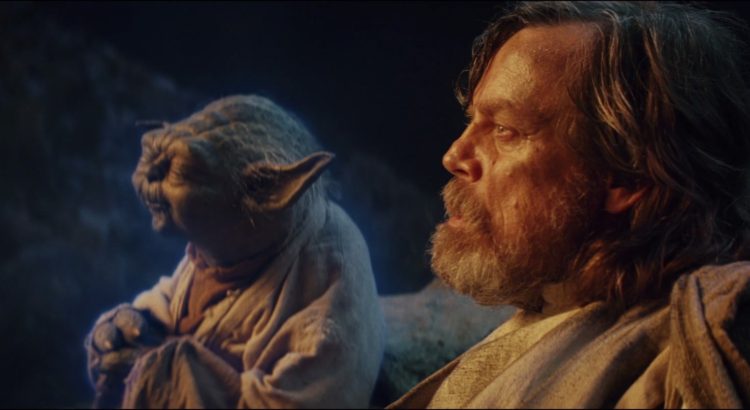There was a moment in my first viewing of The Last Jedi in which I went “Welp, there goes my credibility. The website is never gonna let me write for it ever again.” Understand, I’m not much of a theorist. I’m better at reflective analysis, and overall, I prefer it. It keeps me from being disappointed that my Snoke theory didn’t work out.
Nevertheless, I tried my hand at theory in my first guest piece here at Eleven-ThirtyEight, ending on a claim that Finn would become an iconic Star Wars archetype – the arbiter of compassion – and would become a mentor of sorts to Rose. I was certainly wrong about that.
Yet somehow here I happen to be, on staff at the very site of my blunder. It’s a small example of some evergreen Star Wars discourse. We discuss frequently the nature of redemption, especially with our most recent antagonist, but this is a broad topic. One person may use “redemption” to mean forgiveness, while another uses it to mean recompense, and a third will use it to mean repentance.
Repentance is not the same thing as recompense, and neither of them are remotely similar to forgiveness, and yet all are invoked to build this idea of redemption. In my understanding of it, redemption is not a concept that stands on its own, but rather is comprised of many elements that weave together. One of these elements is grace.
The very first moment that Rose and Finn share the screen, Finn fails the test of compassion, which I outlined my first article:
It’s the moment when a character encounters an individual who is undesirable to or unvalued by society in some way. Helping or showing compassion to this individual appears, on the surface, to pull time and effort away from the character’s goal. The test is: will the character divert from their path to help this individual, or will they continue on their way? Their choice in this matter reveals their true self and results in consequences.
Rose is in a corner by herself, openly weeping for her sister. Not only does Finn ignore her, but he uses the fact that she’s emotionally preoccupied to try to board an escape pod. It’s the first time we see him fail this test, and he fails it hard.
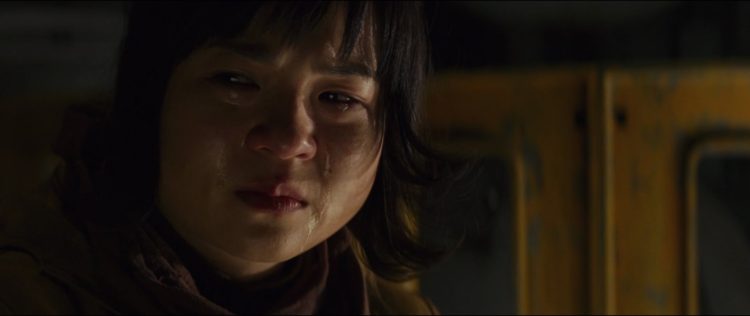
It’s a mirror to another in The Last Jedi, who once passed the test with flying colors only to fail it now: Luke Skywalker. Rey is Luke’s test of compassion, and he doesn’t just fail. He actively rejects the test, casting the lightsaber over his shoulder and shutting Rey out.
Caught up in their fears, Finn and Luke both fail, because on a certain level, they find themselves unworthy of it. Finn’s reluctance to accept the mantle of “Resistance hero” and Luke’s rejection of the Jedi’s role against the First Order are established in the theatrical release, but they jump into the spotlight with a pair of deleted scenes included in the novelization by Jason Fry.
Much like The Force Awakens, Finn finds himself presumed to be something he’s not: a Resistance fighter. Unlike The Force Awakens, Finn immediately tries to explain to his friends that they’re making a faulty assumption.
“Look, Poe,” he said. “I believe in what you guys are doing. But I didn’t join this army – I followed Rey here. I just don’t want you thinking I’m something that I’m not.”
Chapter 7
“It’s going to be all right, don’t worry,” Poe said. “You’re with us, where you belong.”
His friend’s reaction only made Finn feel more guilty… It was a kind gesture, which was no surprise – Poe had never been anything but kind to him… But that only meant Poe would be even more disappointed when he found out how thoroughly he’d misjudged Finn.
For Luke’s part, when he finally agrees to teach Rey, one of his lessons is the test of compassion. A test which he accuses the entire Jedi Order of failing.
“They come once a month to raid and plunder the Caretakers’ village,” [Luke said]…
Chapter 17
“Well, come on!” she urged Luke. “We’ve got to stop them!”…
“Do you know what a true Jedi would do right now?” Luke asked, as if they had all the time in the world. “Nothing… That burn inside you, that anger thinking of what the raiders are going to do? …The books in the Jedi library say to ignore all that. Only act when you can maintain balance. Even if people get hurt.”
… “I thought they were in danger,” Rey said. “I was just trying to do something.”
“And that’s what the Resistance needs – not an old failed husk of a religion. Do you understand now?”
These become excuses for Finn and Luke, reasons why they are destined to fail the test, regardless of their past heroism. In fact, their status as legends crumbles swiftly within The Last Jedi. Rose’s hero worship turns to angry disappointment, but Finn’s doubts about himself are always first from his own mouth. Luke peels away his own mythology, citing the Jedi legacy as hubris, hypocrisy, and failure, tying himself to that same legacy. This willingness to reside in their failures, in the worst parts of themselves, places Finn and Luke in the same mindset as Kylo Ren.
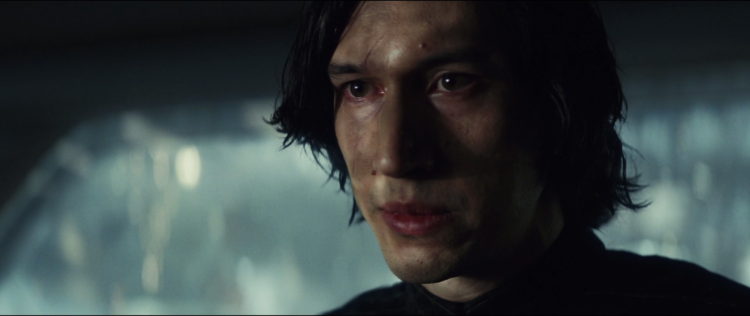
“You’re a monster”, Rey snarls at him, to which Kylo easily replies, “Yes. I am.”
In a galaxy without grace, Kylo, Finn, and Luke are all correct. Kylo is a monster, Finn is endlessly running, Luke is a hypocrite, and they can only live by those definitions. There is no room for correction or growth, and therefore it’s not worth even trying to be better.
Yet there’s also the idea posited that in a galaxy with grace, we encounter the same issue. If grace exists, then correction is nullified, and there is no incentive to be better. Redemption – in a galaxy such as this – fails to hold people accountable.
In college, I was on a panel of Christian and atheist students, where we fielded various questions from attendees on each of our beliefs. While it was set up in good faith between parties, the attendees usually focused on the type of “gotcha” questions we of different beliefs like to throw at each other. But I do recall one very good question directed at me and the other Christian panelist: how can Christians claim that they’re “good” when God lets them off the hook because of Jesus? What incentive is there to not do wrong if God is just going to forgive you anyway?
I am going to be far more eloquent today than I was almost a decade ago, [1]My primary verses for the response were Romans 6:1-2 “What shall we say then? Shall we continue in sin that grace may abound? By no means! How shall we who died to sin live any longer in it?” but the core of the response is the same: grace is not designed to make someone complacent.
Damnation can make one complacent, and so can the utter absence of consequences. But grace, like the other elements that make up redemption, requires first the acknowledgement that a wrong was done. If there was no wrongdoing, there is no need for grace.
So if grace is not the absence of consequences, what is it? Because it is certainly at odds with damnation. Grace is what makes failure the greatest teacher: it’s an opportunity to be better.
Luke Skywalker: “There’s still conflict in you.”
Battlefront II
Del Meeko: “Of course there’s conflict in me. I’m not blind. I know what the Empire is capable of. But what else is there?”
Luke: “A choice.”
Del: “What, the Rebellion?”
Luke: “No. A choice to be better.”
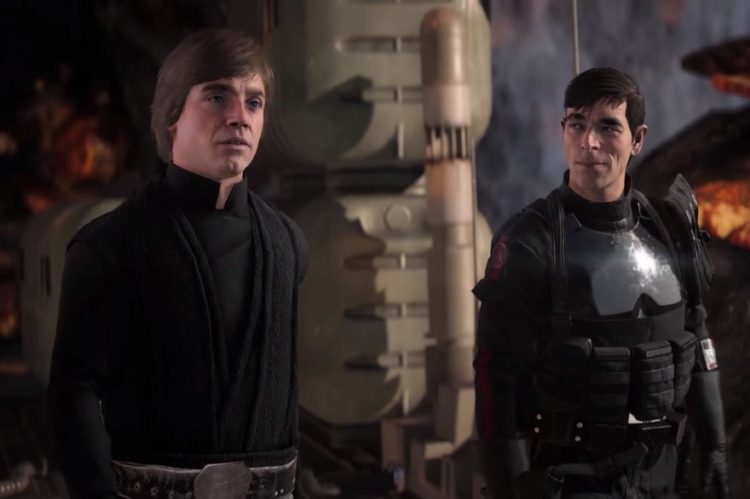
We cannot argue that Finn, Luke, and Kylo do not face consequences for their actions. Finn gets zapped across an escape pod and nearly gets thrown into the brig. Luke faced immediate consequences for drawing his saber on Kylo, and Rey is dogging his steps throughout the movie in a manner that inadvertently keeps reminding him of his failure. Kylo finds himself humiliated in front of his troops and cut off from the first positive connection he’d allowed himself to have since joining the First Order. These guys are most certainly held accountable for their actions, but grace is what allows them to try again.
Author’s Edit, 11/26/19: When I initially wrote this piece, my goal was simply to focus on the pathway of mistake/consequences/grace/self-correction. However, in doing so, I failed to recognize and address the contexts of each of these examples. In particular, Finn’s mistake is the least offensive out of all of them, and yet he – the black man – is the one whose consequences are the most physically violent. Luke is attacked by Kylo, yes, but the crux of his consequence is the weight of his failure. The crux of Finn’s consequence is a physical attack and the threat of imprisonment. Intentional or not, this is a display of anti-black racism, and in failing to address it, I upheld and perpetuated that same anti-black racism. I framed the violence of a black man’s consequences as necessary to his correction/growth. For that, I apologize.
Rose telling Poe that she met Finn by “just luck” is an act of grace. She doesn’t tell anyone of Finn’s attempted flight, which would have gotten him thrown right back into the brig. Instead, Rose gives him the opportunity to prove himself a hero, and he does so almost instantly. By giving Rey’s beacon to Poe for safekeeping, Finn ensures that he won’t try to run. He’s diverting from his original goal to help the Resistance. After this, Finn spends the rest of the movie passing various tests of compassion, to the point that Poe has to physically restrain him from rushing out to Luke’s aid.
Rey offering the lightsaber to Luke in the rain is an act of grace. After all his dismissals, after learning the truth about his encounter with Ben Solo, Rey gives Luke an opportunity to act as a Jedi again. His response takes a little longer than Finn’s but sure enough by the end of the movie, with Yoda providing the thesis of grace, Luke accepts the grace and uses it to face his failure with Ben and save the Resistance.
In The Last Jedi, Kylo is the recipient of multiple acts of grace and yet continually chooses to sink further into his accepted identity as a “monster”. This does not mean that the acts of grace failed. Rey and Luke did exactly what grace is supposed to do: offer a chance to be better. When Kylo doesn’t accept the grace offered, Rey and Luke stand in resistance to him, demonstrating that grace does not absolve the responsibility of Kylo himself.
Being but one element of redemption, grace must work in conjunction with the others. Grace is a call to the subsequent element of repentance. It’s up to Finn, Luke, and Kylo to respond. Like the test of compassion, their responses result in consequences. Unlike the test of compassion, the call of grace doesn’t reveal their inner selves, but rather who they choose to become.
A Resistance hero. A Jedi. A monster.
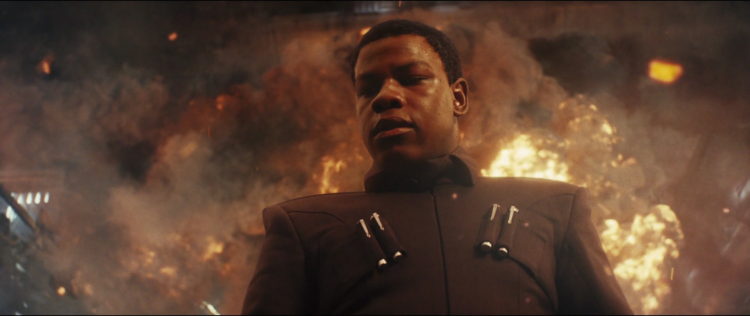
Knowing what grace is and what grace does, the question then becomes: what are the limits of grace? Does grace have limits? Can an offer of grace expire? Is there an alloted number of acts of grace for each individual?
None of these are things we can answer with any certainty in Star Wars. Both we the audience and the storytellers of Lucasfilm are going to be bringing our own worldviews into these stories. We are going to see and share what we believe about the real world through these characters. For my own part, I believe there’s a limit to the amount of grace a single individual can offer another – healthy boundaries and resisting evil are both essential – but there’s no limit to the opportunities of grace that God can provide. When I bring that worldview to Star Wars, “God” translates in part to the Force.
Finn responded immediately to Rose’s act of grace, never reaching the limit of what she was capable of offering. Luke reached the limit that Rey was able to offer, but the Force came to him as Yoda to give him a good thwack on the head. With Kylo, it seems that he’s run out of people who can offer him grace, but that doesn’t mean the Force has run out on him yet. Perhaps he’ll finally accept the call to repent and become better. Until The Rise of Skywalker comes out, any assertions one way or the other are theories. And I, for one, have learned not to play in that sandbox. I don’t want to test the limits of the website’s grace.
| ↑1 | My primary verses for the response were Romans 6:1-2 “What shall we say then? Shall we continue in sin that grace may abound? By no means! How shall we who died to sin live any longer in it?” |
|---|
